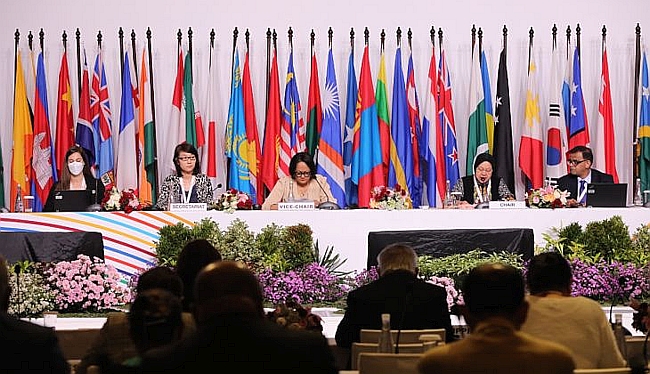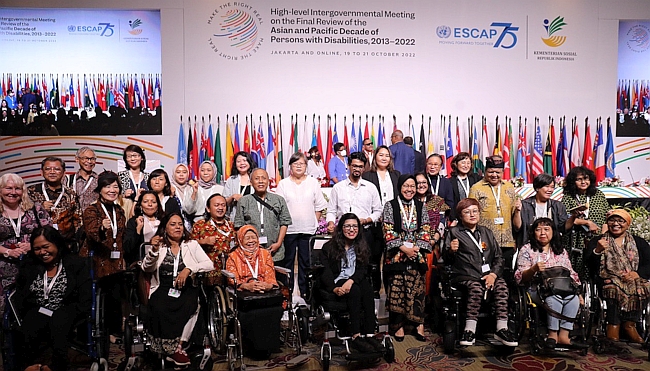
JAKARTA, Oct 24, 2022 – (ACN Newswire via SEAPRWire.com) – The ‘High-level Intergovernmental Meeting on the Final Review of the Asian and Pacific Decade of Persons with Disabilities’ (HLIGM APDPD) closed on Friday (Oct 21) with 53 Asia-Pacific and 9 associated countries adopting the landmark Jakarta Declaration, marking the start of the fourth ‘Asian and Pacific Decade of Persons with Disabilities’.
 |
|
|
 |
|
|
“Today, on the last day of the high-level intragovernmental meeting in the Asia Pacific, we are adopting the Jakarta Declaration 2023-2032, which will be followed up by all members, accelerated and implemented,” said the meeting chair and Indonesian Social Affairs Minister, Tri Rismaharini (Risma).
“Through the Jakarta Declaration, we reaffirm our global commitment to a better life for all persons with disabilities,” said Risma, emphasizing the commitment of Asia Pacific countries in realizing the Incheon Strategy, initiated ten years ago. “The priority issue is an alignment of the Convention on the Rights of Persons with Disabilities (CRPD) at the level of legislation.”
“It is time to increase efforts and take affirmative steps to implement universal design in all public areas, to increase the capacity of people handling persons living with disabilities in all sectors, and conduct national breakthrough campaigns to build awareness about disability,” she said. “Harmonization of legislation is the toughest challenge for our own government, as it has central, provincial and regency/city government levels.”
Under-Secretary-General of the United Nations, and Executive Secretary of the Economic and Social Commission for Asia and the Pacific (UN ESCAP), Armida Salsiah Alisjahbana said although the implementation of the CRPD was making progress, people with disabilities in the Asia Pacific region face obstacles in education, work, decision making, and many other aspects.
She invites UN ESCAP members to strengthen partnerships with disability organizations, the private sector, United Nations entities and the others to create a comprehensive community approach. Armida hopes that people with disabilities can participate in all policies and programs related to disability actively and significantly, in line with the spirit of ‘nothing without us about us’.
HLIGM APDPD was held on a hybrid basis from 19 – 21 October 2022 and was attended by delegates from 53 member states, 9 association member, observer countries, UN agencies, and civil society organizations.
Written by: PR Wire, Editor: PR Wire (c) ANTARA 2022
Source article at: https://en.antaranews.com/news/256377/asia-and-pacific-countries-make-jakarta-declaration-agreement
UN ESCAP member countries also underlined the importance of making strategic investments to push disability-inclusive development through a whole-society approach in collaboration with relevant stakeholders, especially organizations of persons with disabilities and private sector entities, in order to accelerate action to promote and protect the rights of persons living with disabilities.
“I encourage all participants to continue their cooperation with one another and to take all necessary steps to make the recommendations formulated during this meeting in Jakarta. Now and in the next decade, we must come together and work it out,” Rismaharini said.
The first point of the Jakarta Declaration is to harmonize national legislations with the Convention on the Rights of Persons with Disabilities, after the convention is ratified, by conducting a comprehensive and regular review of national legislations and appropriate regional regulations.
The second is to promote the meaningful participation of women and men with disabilities of all ages, including by closely consulting and actively involving children and youth with disabilities through their representative organizations, in planning, implementation, and decision-making on policies, programs, and political processes through reasonable accommodation.
The third point involves special attention to the special needs of persons with diverse disabilities and women, children, and elderly with disabilities to increase accessibility of the physical environment, including information and communication technology and systems, public transportation, and essential information and services related to disaster risk and public health emergencies and other public services.
The fourth is to promote the power of the private sector, including its resources, innovation, and technology talent, to push disability-inclusive development by adopting disability-inclusive public procurement policies to promote the adoption of universal design and accessibility measures for infrastructure, technology, and information and communication services that are publicly obtained.
The fifth is to promote a gender-responsive life cycle approach to develop and implement policies and programs related to disability by paying special attention to children, youth, women, and elderly people living with disabilities.
The sixth is to take action, based on information provided by competent national institutions and other recognized sources, to close the disability data gap and strengthen the capacity to track progress in disability-inclusive development at the national and subnational levels by producing comparable and qualified data as chosen by gender, age, and disability across sectors.
Written by: Devi Nindy Sari R, Resinta S, Editor: Rahmad Nasution (c) ANTARA 2022
Source article: https://en.antaranews.com/news/256205/53-asia-pacific-countries-agree-to-jakarta-declaration-on-disability
Copyright 2022 ACN Newswire. All rights reserved. (via SEAPRWire)
source https://netdace.com/acn-newswire/asian-and-pacific-countries-adopt-jakarta-declaration-2023-2032/